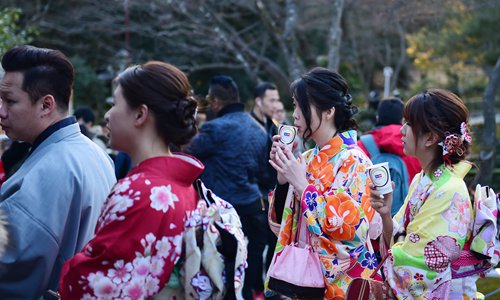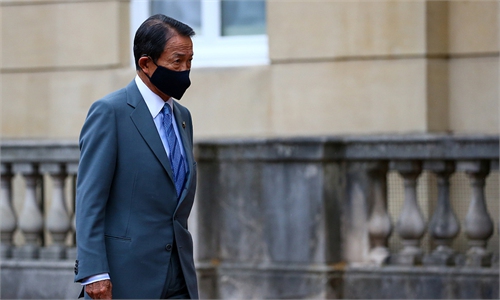Knockoff Japanese shopping street in NE city traumatized by war draws ire, raises concerns of 'cultural invasion'

Tourists, including some from China, wear kimonos in Kyoto, Japan in December 2017. Photo: VCG
A Japanese-themed shopping street recently opened in Dalian, Northeast China's Liaoning Province has triggered heated debates among Chinese netizens, with many questioning if it is appropriate to build a street run by Japanese firms in a place once deeply traumatized during the War of Resistance against Japanese Aggression (1931-45.)
The controversial street, costing about 6 billion yuan ($927 million,) was developed by a local real estate agency in Dalian and opened on August 21, Japanese media Nikkei Asia reported. Designed by a group of Japanese architects, who collected specific widths and heights of buildings and roads in Kyoto and then reproduced them in the Chinese coastal city, the street highly resembles the looks of the Japanese city in every way.
Panasonic and other 28 shops, including Japanese cosmetics stores and ramen restaurants, have opened on the street. According to the Nikkei report, only Japanese companies will be allowed to run a business there, or it should be a joint venture, and all products should be made in Japan. The aim is to build it into a base for selling Japanese goods, the report said.
It is the third Japanese-style street in China following Guangzhou in South China and Suzhou in East China. However, the knockoff street in Dalian has been met with sharp criticism from the Chinese public, who questioned if it is proper to build such a street in a city that suffered the invasion of Japanese troops during the World War II.
Some have noticed that the street is opposite the Qiqi Street in Dalian, which was named after the July 7 incident in 1937, when the imperial Japanese army launched an assault on the Lugou Bridge in Beijing that marked the beginning of the all-out war against Japanese aggression.
"Could it be another form of cultural invasion? We should raise the alarm," a netizen commented on Chinese social media.
In a video circulating on China's Twitter-like Sina Weibo, some girls are seen wearing kimonos, a traditional Japanese garment and the national dress of Japan, and walking on the street.
However, some others hold different opinions, saying that they only see it as a place to buy Japanese-imported goods, or a place to have fun during vacations, and people should not be over-sensitive about it.
Global Times


